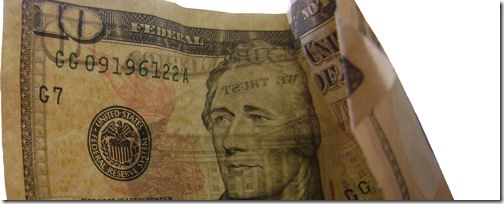
It’s been in the news a bit recently. Whether it’s comments about whether the dollar will cease to be the reserve currency for the world, whether OPEC will cease to place worth of oil in dollars, and whether China will take over the world. The ever inflating dollar is quite the topic.
Dean Baker from the Guardian suggests that, contrary to popular belief, we should embrace the dollar’s downfall.
His reasoning is quite simple to understand. Basically, if the dollar gets to be less in value than the Chinese currency, it will be cheaper to buy things locally than to buy from China. This, in turn, should help us export goods (if we still know how to produce goods), because it’ll be cheaper to buy from us than to buy locally.
What’s happening right now is currency manipulation. Any currency that is strong (like the British Pound) leads to a consumerist economy, because it is cheaper to buy from a cheaper currency than it is to buy local, and you have a hard time selling things because your currency is strong.
If I Were a Protectionist
If I were a protectionist, this would make a good argument for closing off the borders and buying locally. Simply put, we’re hurting our manufacturing because we are unable to sell our goods to other countries because of the high prices. And because Americans would rather buy things at the cheapest rate (what country wouldn’t?), we’ll gladly ship things in from other countries and pay less.
If you don’t tariff and you don’t close the borders, you’re relegating yourself to be a consumerist state—just until the tide turns, the other nations catch up (or pass you) and your services are now the affordable ones.
Not Playing Fair
The problem is that other nations are not playing fair. With China continuing to buy our debt at low interest rates, they are keeping the dollar stronger than it would be, and thereby making it so that the system cannot correct itself. We are stuck being a consumerist nation, and will continue to import more than we export.
The only other solution that I see is to change some of our laws so that it isn’t as expensive to produce. That way the difference between the American product and the foreign product isn’t as big, so people can be persuaded to buy American.

It is true the dollar is declining but not against the Chinese Renminbi. Also, for decades people have said the USA has lost the manufacturing base. The data shows the USA continues to manufacture more than anyone else ( http://investing.curiouscatblog.net/2009/10/13/data-on-the-largest-manufacturing-countries-in-2008/ ).
It is true the Chinese government (and Japan and others) have been supporting the value of the dollar. But the main reason the USA is a consumer nation is we buy more than we produce (we spend more money than we earn and have been doing so for decades). We have been living off the wealth built up after World War II. And other nations have been adding to their wealth by consuming less than they produce.
.-= John @ Curious Cat Investing and Economics Blog´s last blog ..Amazon Soars on Good Earnings and Projected Sales =-.
Take a look at any nation with a strong currency– be it the U.S. or Britain or others– and I believe that you will find that they have a lot of imports and that manufacturing is weak.
As far as being a consumer nation, while I agree that the U.S. is in the pickle that it is in because of credit (spending more than we earn) and the fact that our government has run in the red for a very long time, it’s also because it is cheaper to consume goods from other countries than it is to produce them here for sale. This is not just from the strength of the currency, but also from the weight of the regulations that we put on businesses locally– as well as the taxes.
The government’s view would be laughable if it were not more serious– they believe that they can tax and regulate business putting a huge burden on them, but then desire that they produce goods that are cheaper than places that have no such things. And then we pass bailouts to help out these companies, all the while piling on things that make it harder for them to operate… It’s a cycle that the government’s been doing for years, and they still don’t see it.
John I’m finding it hard to believe your statement, and follow-up link, about US manufacturing being the highest in the world. What is it that we’re still making exactly besides cars? A quick jaunt around the local mega chains, malls, and outlets lands me in mountains of goods from china and other low wage countries. I mean I know there’s the Vermont Teddy Bear Company but what are we talking about here?
By “change some of our laws so it is easier to produce”, do you mean allowing corporations to employ workers at near slave wages under abhorrent conditions? That’s why the goods are made in China, because the wages are low and under a totalitarian system the workers can’t complain. Is that what you are advocating for the US?
There is no reason to be enslaved by the concept of “free trade”. We didn’t grow to become a world power by opening our markets, but my being protectionist. No nation has risen to great economic power without restricted imports. Now that our economic power is on the decline (except on Wall Street), maybe we should return to the ideas that made us great.
Obviously you don’t know the regulatory burden placed on even the smallest companies. I started an LLC a bit back. We help host some small websites, and for the “privilege” of doing this in the U.S. as a partnership, I paid $600– almost all my income from that business– the first year. I’m not saying slave wages and poor working conditions. I’m talking about the regulatory compliance issues, and taxes that have made it cost-prohibitive to run business here.
I mean, saying “slave labor in China” is a factor is probably true– and yet when you add on the cost of shipping, many would rather make things here– it’s just too expensive with all the counsel that you have, the regulatory compliance that you have to have…
Taxes are a big thing. Even small corporations pay corporate tax, tax on the goods when they buy them, tax to resell them, tax on what they pay employees, tax for SSA, etc.
Try owning/running a business in the U.S.
And yes, I’d be in favor of putting some more controls in place so that we encouraged domestic production– might even be willing to support a tariff or two. We have the problem, however, that we’re so dependent on foreign oil (because we won’t do anything locally but build windmills) etc. that if we did become more protectionist we’d hurt ourselves.
Open us up for oil and nuclear and close down the borders, we’d see some revival. A better idea than stimulus plans and massive debt for sure.
I do own a business in the US and I do have to pay taxes, but the restrictions on my business and the impact of those taxes is minimal. A corporation tax is part of the cost of doing business and receiving the legal advantages of being chartered as corporation by the state. As with any expenditure one makes, the cost has to be weighed against the benefit and we do benefit greatly from being able to run our businesses in the USA.
There is, however, a serious problem with business taxation in this country. Because you and I can’t afford tax shelters, front companies in the Cayman Islands, and a stable of accountants and lawyers to find every possible tax loophole, and a stable of lobbyists to see that more loopholes are enacted, we actually have to pay our taxes. The actual taxes paid as a percentage of revenue are far more for small business than for the large corporations.
I agree that we have to get off foreign oil, and that in the short run wind and solar are not going to have a tremendous impact. The answer is not to destroy national parks to get a few more months of oil or to increase our stockpiles of nuclear wastes. The answer is conservation. We use far more oil than we need because we have designed our entire built environment around cheap oil. A stimulus plan and some tax “incentives” could go a long way toward rectifying that problem.
What you miss is, why are companies putting their money overseas? Mostly because the taxation policy of this country is out of control. Look at New York City– they raise taxes on their highest earners, so what do some of those people do? Leave town. So what’s government’s reaction? Raise taxes.
Who pays people’s salaries? Those who are our bosses. And what happens if more of their money is taken? They have less to pay, and they let people go.
If you wanted lower unemployment, you’d give those with businesses more money to be able to hire people, not tax them so they can’t afford them.
As far as energy– certainly there are better and more efficient ways to do things. Part of it’s psychology. Part of it is providing efficient, on time, transportation. Part of it is the design of our cities and towns and where we live. Part of it is regulations and the cost. Lots more than just a stimulus plan and incentives.